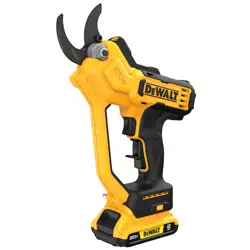Loading ...
Loading ...
Loading ...

9
ENGLISH
Register Online
Thank you for your purchase. Register your product nowfor:
• WARRANTY SERVICE: Registering your product will
help you obtain more efficient warranty service in case
there is a problem with yourproduct.
• CONFIRMATION OF OWNERSHIP: In case of an
insurance loss, such as fire, flood or theft, your registration
of ownership will serve as your proof ofpurchase.
• FOR YOUR SAFETY: Registering your product will
allow us to contact you in the unlikely event a safety
notification is required under the Federal Consumer
SafetyAct.
• Register online at www.dewalt.com
Repairs
The charger and battery pack are notserviceable. There are
no serviceable parts inside the charger or batterypack.
WARNING: To assure product SAFETY
and RELIABILITY, repairs, maintenance and adjustment
(including brush inspection and replacement, when
applicable) should be performed by a DeWALT factory
service center or a DeWALT authorized service center.
Always use identical replacementparts.
Blade Maintenance (Fig.I)
WARNING:
Use gloves and proper eye
protection while removing, sharpening, and installingblade.
The cutting blades are made from high quality, hardened
steel and with normal usage, they will not require
resharpening. However, if you accidentally hit a wire fence,
stones, glass, or other hard objects, you may put a nick in the
blade. There is no need to remove this nick as long as it does
not interfere with the movement of the blade. If you drop
the trimmer, carefully inspect it for damage. If the blade is
bent, housing cracked, handles broken or if you see any other
condition that may affect the tool's operation contact your
local authorized service center for repairs before putting it
back intouse.
1. Remove thebattery.
2. Remove blade from pruner. See instructions for
Removing and InstallingBlade.
3. Wear proper eye protection and gloves and be careful
not to cutyourself.
4. Secure blade
6
in a vise
15
as shown in Fig.I.
5. Carefully file the cutting edge
16
of the cutting blade
with a fine tooth file
17
(not included) or sharpening
stone (not included), maintaining the angle of the
original cuttingedge of the cuttingblade.
6. Inspect the edge of the fixed blade and remove any burrs
with a fine toothfile.
7. Install sharpened cutting blade as described in the
Removing and InstallingBladesection.
Blade Lubrication (Fig.A)
1. After use, remove thebattery
8
.
2. Carefully apply a resin solvent to the exposedblades.
Storage (Fig.A)
1. After use, remove thebattery.
2. Keeping your hands away from the blade, and store in a
dry location, away from the reach ofchildren.
Accessories
WARNING: Since accessories, other than
those offered by DeWALT, have not been tested with
this product, use of such accessories with this tool
could be hazardous. To reduce the risk of injury, only
DeWALT recommended accessories should be used with
thisproduct.
Recommended accessories for use with your tool are
available at extra cost from your local dealer or authorized
service center. If you need assistance in locating any
accessory, please contact DeWALT call 1‑800‑4‑DeWALT
(1-800-433-9258) or visit our website:www.dewalt.com.
7. Remove the cutting blade
6
as shown in Fig.H.
8. Install the new cuttingblade.
NOTE: Ensure the cutting edge faces toward the fixed
cutting blade as shown in Fig.H.
9. Insert the cutting blade screw
12
through the cutting
blade and screw mount
14
into nut
13
.
10. Use the hex wrench to loosely tighten the cutting blade
screw
12
.
11. Flip the product onto its other side and use the hex
wrench
10
to fully tighten the fixed blade screw
11
as
shown in Fig.G.
12. Flip the product onto its other side and use the hex
wrench
10
to fully tighten the cutting blade screw
12
.
Cleaning
WARNING: Never use solvents or other
harsh chemicals for cleaning the non‑metallic parts
of the tool. These chemicals may weaken the plastic
materials used in these parts. Use a cloth dampened
only with water and mild soap. Never let any liquid get
inside the tool; never immerse any part of the tool into
aliquid.
Loading ...
Loading ...
Loading ...
